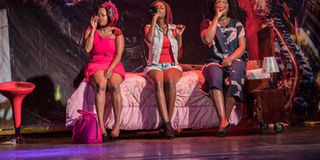Silent Voices celebrates black theatre with fest of plays

A scene from Adong Anyira’s Holy Maria. PHOTO CREDIT: ZAHARA ABDUL/SILENT VOICES
What you need to know:
- Yet for the past two weekends, as Silent Voices Uganda put on shows celebrating black theatre and joining the rest of the world in the annual 48 Hours in Harlem staging, the question of theatre’s death and life still creeped up in the audience.
- Not that people didn’t like what they saw, they almost concurred that the past few years have seen Ugandan stages embrace lots of questionable content in form of productions.
The life of theatre, was for almost two years a topic discussed as part of the International Theatre Day by drama students from Makerere.
Since this was all happening at the National Theatre, at the time its own existence was in question, the topic and not what its content left many practitioners of theatre in arms.
Yet for the past two weekends, as Silent Voices Uganda put on shows celebrating black theatre and joining the rest of the world in the annual 48 Hours in Harlem staging, the question of theatre’s death and life still creeped up in the audience.
Not that people didn’t like what they saw, they almost concurred that the past few years have seen Ugandan stages embrace lots of questionable content in form of productions.
And yet the Silent Voices ten-minute plays did offer an insight of what the African future of theatre can be if the needed support is available; the production were bringing to the fore plays directed by the alumnus of the Silent Voices annual apprentice programme.
Under the programme, applicants are given training in different fields of a production like directing, light, sound and choreography among other fields.
The productions scheduled to be staged were particularly directed by Patience Nitumwesiga and Samuel Mwanja alumna of the programme and Pamela Keryeko and Takunda Kramer, both apprentices of the current directors’ class.
The five productions put together for the shows include Keepers, All Ok, Better Than Yellow, Shadow of An Angel, For Coloured Who Have Considered Coloured Girls and When What wasn’t enough.
Much as all the productions come from a contemporary African America, the directors had the burden of interpreting them and presenting them in a form that would be digestible and accessible to a Ugandan audience.
They highly depended on a multinational bankable acting cast that included Keryeko, River Dan Rugaju and Ernest Bbumba, three fixture collaborators of Silent Voices and Takunda Lisa Gitu from Zimbabwe and Kenyan actress Nice Githinjii.
With productions easily transiting into each other, you could easily give it up to the cast for not only managing their time but always being able to be the characters they were not minutes before.
Githinji, Gitu and Keryeko were quite a trio on productions like Holy Maria, where they were all on stage at the same time, to Better Than Yellow where Karyeko, dressed as a man, was the beau to Githinji - their ability to feed off each other’s’ energy made much of their performances more believable and accessible.
Even the duo that had Bryan Powers Byamukama and Takunda in When What Wasn’t Enough was too convincing and as confusing at the same time.
But the productions on show were what stood out most, tackling American problems that easily mirrored our social ones like colorism, bare racism and sexism among others.
For shows that were technically put together in twelve days, you could cut the cast some slack for the wanting American accents that seemed to be on and off of course those things can be tricky, at times they make off with important lines from the script.
According to artistic director Silent Voices Uganda, Judith Adong, this year they fo-cused on black consciousness that directors had to imagine were written for a Ugandan audience and how they could have been written.
Nitumwesiga directed Better Than Yellow and notes that her way into the story was based on a fact that she has seen colorism and its effects in Uganda while Mwanja too noted that reading For Coloured Boys Who Have Considered Coloured Girls made him realise that many times men have been unfair to women.




